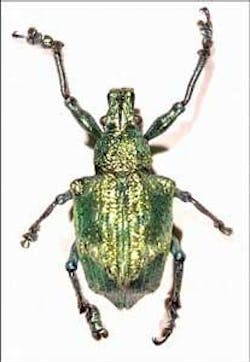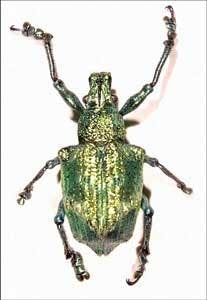Photonic beetle is nature’s answer to optical computers
The scales of an inch-long beetle from Brazil possess properties that scientists have not been able to fabricate synthetically. Researchers at the University of Utah (Salt Lake City, UT) used a scanning electron microscope to examine the three-dimensional structure of the shell of the lamprocyphus augustus weevil, which glitters an iridescent green from all angles. Michael Bartl, professor of chemistry and physics, and his team found that the beetle’s exoskeleton consists of scales with a structure ideal for ultrafast optical computers of the future, similar to that of the crystal-lattice structure of diamond.
The scales are made of some 200 pieces of chitin, the same ingredient in fingernails. Each scale measures 200 × 100 µm and comprises a lattice of chitin stacked with air. Each piece of chitin is oriented in a different direction, reflecting a slightly different color of green. The shell of the beetle is not semiconducting, so is not useful for optical computing. But a similar, fabricated diamond-like structure would work like a photonic bandgap to reflect light of a certain wavelength. Contact Michael Bartl at [email protected].

